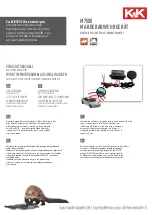
ZS3L Datasheet
Hangzhou Tuya Information Technology Co., Ltd.
16
V1.0.1
(2)
The shelf life of a dry-packaged product is six months from the date when the
product is packaged and sealed.
(3)
The package contains a humidity indicator card (HIC).
Figure 6-6 HIC for ZS3L
3.
Bake a module based on HIC status as follows when you unpack the module
package:
(1)
If the 30%, 40%, and 50% circles are blue, bake the module for 2 consecutive
hours.
(2)
If the 30% circle is pink, bake the module for 4 consecutive hours.
(3)
If the 30% and 40% circles are pink, bake the module for 6 consecutive hours.
(4)
If the 30%, 40%, and 50% circles are pink, bake the module for 12 consecutive
hours.
4.
Baking settings:
(1)
Baking temperature: 125±5°C
(2)
Alarm temperature: 130°C
(3)
SMT placement ready temperature after natural cooling: < 36°C
(4)
Number of drying times: 1
(5)
Rebaking condition: The module is not soldered within 12 hours after baking.
5.
Do not use SMT to process modules that have been unpacked for over three months.
Electroless nickel immersion gold (ENIG) is used for the PCBs. If the solder pads are
exposed to the air for over three months, they will be oxidized severely and dry joints
or solder skips may occur. Tuya is not liable for such problems and consequences.
6.
Before SMT placement, take electrostatic discharge (ESD) protective measures.
7.
To reduce the reflow defect rate, draw 10% of the products for visual inspection and
AOI before first SMT placement to determine a proper oven temperature and
component placement method. Draw 5 to 10 modules every hour from subsequent
batches for visual inspection and AOI.
6.4 Recommended Oven Temperature Curve
Perform SMT placement based on the following reflow oven temperature curve. The






































